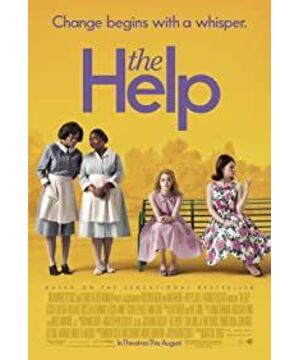The background of the film is Mississippi, USA in the 1960s. This southern part of the United States has a strong tradition of racial discrimination. For a long time, the lives of blacks have been shrouded in the shadow of domineering whites, and various laws and regulations with racial discrimination. Also unimpeded in reality. However, this era is also when the black civil rights movement is in full swing. Various black rights movements such as the Racial Equality Conference, the Black Panther Party, and the March of the Poor are surging. Pastor Martin Luther King also published his famous article during this period. The speech "I have a dream".
For those black women who live in quiet small towns, have no higher education, have little knowledge, and lack civil rights awareness, Martin Luther King may be too far away from them, but the faces of white housewives are Shaking in front of my eyes every day. Abilene is such an ordinary woman who makes a living by working as a nanny for a white family. She takes good care of her employer’s little daughter every day, and her meticulous care even makes the little girl say "You are my real mother" Truth: Minnie’s identity is the same as that of Abilene, but she is bold and bold, and will never accept the things she can’t understand. In the eyes of the white housewives who applied fat and powder, the black maids were filthy and filthy. For this reason, they strictly prohibited their helpers from using the toilets at home, but Minnie broke this ring and was smashed after she used the master toilet. , Minnie was fired.
Skeeter is a white woman with a dream of a writer. In her memory, a black maid accompanied her growing up like a mother. This gave Skeeter a natural affection for blacks. She could not understand the discrimination suffered by black maids and decided to interview them and compile their personal experiences into a book. At first, even Abilene did not accept her, but as time passed, Abilene, Minnie, and even the black maids in the whole town began to confide to Skeeter. In the end, this This "Help" is ready to go...
"Help" is a typical female film, the main characters in the film are women, but regardless of skin color, their personality shaping is in place, I believe this is not a small challenge for male director Tate Taylor. There is no big plot twist in "Helping Together", it is to lay out the character and destiny of the characters in the short-term in the homework. But the film does not lack dramatic tension. In the seemingly ordinary daily life, there is always a huge hidden danger of contradictions. As the narrative progressed, the audience’s emotions have been firmly controlled by the film, and the more black women complained, the more shocking facts became-when Abilene angrily told Skeeter her own When the son died at the hands of a white racist, this mixed emotion of fear, anger, pain, and sadness must have overflowed the screen.
The truth was being revealed bit by bit, and Skeeter also learned from his mother that her babysitter had been driven away by her. In fact, the whole "Help" is just a process of revealing the truth. But the emergence of truth does not mean hatred and hostility. In 1995, South Africa established the "Truth and Reconciliation Commission" to resolve the historical grievances of the apartheid era. This move also opened up a great path in modern politics-"exchange the truth for reconciliation." The emotional direction of "Help" leads to reconciliation from revealing the truth. Although Abilene was finally fired, although violent racial conflicts still occur in small towns, in general, " The presentation in "Help" is the same as the black civil rights movement in the United States in the 1960s, and it is mainly based on non-violence. And with Skeeter’s efforts, more and more whites in the film began to respect and appreciate the blacks. They did not hesitate to say "thank you" to the black maids, and even cook a meal for them in person—— The white housewife who hates Minnie in the film is more and more like a betrayal clown (of course a bit of facial makeup).
Times have changed. Today, half a century later, the release of "Help" in the United States is actually the best expression of "reconciliation": we seek the truth, but the truth is for reconciliation, and this is the essence of "Help".
(Published in "Southern People Weekly" January 2, 2012)
View more about The Help reviews






